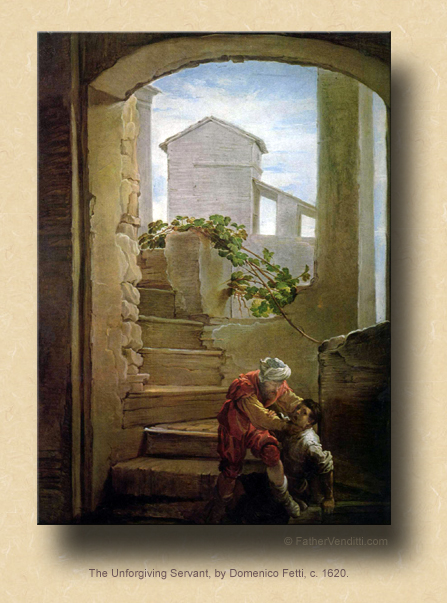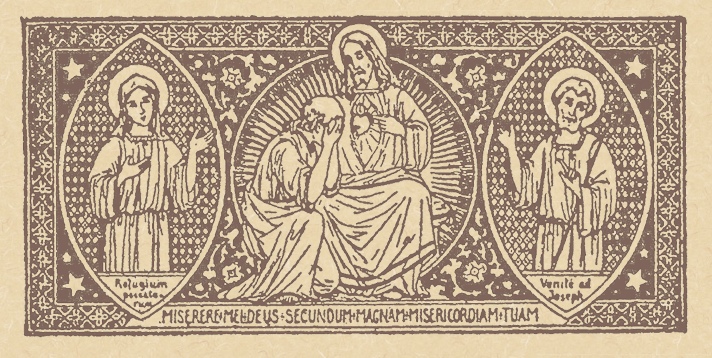Once is Not Enough.
The Memorial of Saint Clare, Virgin.*
Lessons from the secondary feria, according to the ordinary form of the Roman Rite:
• Ezekiel 12: 1-12.
• Psalm 78: 56-59. 61-62.
• Matthew 18: 21—19: 1.
|
…or, from the proper:
• Philippians 3: 8-14.
• Psalm 16: 1-2, 5, 7-8, 11.
• Matthew 19: 27-29.
…or, any lessons from the common of Virgins for One Virgin, or the common of Holy Men & Women for a Nun.
|
The Twelfth Thursday after Pentecost; and, the Commemoration of Saint Tiburtius, Martyr, & Saint Susanna, Virgin & Martyr.**
Lessons from the dominica,*** according to the extraordinary form of the Roman Rite:
• II Corinthians 3: 4-9.
• Psalm 33: 2-3.
• Luke 10: 23-37.
|
If a Mass for the commemoration is taken, first lesson from the proper, the rest from the common "Salus autem…" of Several Martyrs:
• Hebrews 11: 33-39.
• Psalm 33: 18-19.
• Luke 12: 1-8.
|
The Second Thursday of the Dormition Fast; a Postfestive Day of the Transfiguration; and, the Feast of the Holy Martyr Euplus.†
Lessons from the pentecostarion, according to the Ruthenian recension of the Byzantine Rite:
• II Corinthians 10: 7-18.
• Mark 3: 28-35.
FatherVenditti.com
|
 9:57 AM 8/11/2016 — I didn’t give you any kind of homily at all this week so far, although yesterday I did read to you one by Pope Saint Leo. Even on Sunday I was displaced by a special event; so, I will attempt to make up for it today, even though today’s reflection is clearly a repeat. 9:57 AM 8/11/2016 — I didn’t give you any kind of homily at all this week so far, although yesterday I did read to you one by Pope Saint Leo. Even on Sunday I was displaced by a special event; so, I will attempt to make up for it today, even though today’s reflection is clearly a repeat.
It's pretty obvious that the parable our Lord tells us is an illustration of that part of the Lord’s Prayer in which we pray, “Forgive us our trespasses, as we forgive those who trespass against us….” And it’s very easy to misunderstand because it gives the impression that one is the cause of the other: that God will forgive us because we have forgiven others. But the parable our Blessed Lord tells us today gives a very different explanation.
When the servant refuses to forgive the debt of his fellow servant, and his employer comes down on him, why is the employer so upset? What business is it of his? Well, it’s his business because the servant, whom he forgave of a much larger debt, wouldn’t even be around to forgive anyone himself if the employer had treated him the same way. In other words, the forgiveness of the employer to the first servant should have been continued by the first servant to the second servant, but it wasn’t. It is a feature of Christian forgiveness that is found in no other religious system, and applies to the whole subject of grace as understood by the Catholic Church.
I use to listen sometimes to Dr. Laura on the radio. She’s was this person who would try to give advice to people she’s never met;—I’m not even sure if she’s still on the air— she's was raised a Catholic, but converted to the Jewish faith when she got married. And her notion of forgiveness is a very classical Jewish notion. So, women would call her up, for example, and tell her that their husbands have been unfaithful or they caught them looking at dirty pictures on the Internet or something, or how some relative or other did something to hurt them, and they’ll ask if they should forgive. And invariably she would respond by saying that forgiveness requires some kind of recompense: that you can’t forgive someone until they’ve made amends. It’s the classical Jewish point of view: an eye for an eye; forgiveness requires reciprocity. But the parable told by our Lord says something quite different, and I can only imagine how it must have shocked his Jewish audience, because the employer in the story initially takes a classical Jewish point of view: he wants to sell the servant and his family into slavery until his debt is paid off, and only after it’s paid off will he release him. According to the laws set down in the book of Leviticus in the Old Testament, this is what he is supposed to do. But the employer doesn’t stick to it. He feels sorry for his servant and, because the servant pleads with him for the sake of his family, he lets him off the hook completely, so much so that now he doesn’t have to pay the money back at all.
Now, Dr. Laura would probably say that the employer is being a "weenie," that there is no need for him to act this way, and if the servant is worried about his family—well, he should have thought of that before he defaulted on the loan. Our Lord, in telling this parable, is taking a very deliberate swipe at the classical Jewish notion of justice and reciprocity.  Later on in his public preaching he would do it even more directly: “If a man strikes you on one cheek, turn to him the other…. If someone takes your coat, give him your shirt as well…. Love those who hate you, and do good to those who persecute you….” Clearly, our Lord is turning his back on traditional Old Testament teaching about justice and replacing it with something completely different. The question is, what is he replacing it with? Later on in his public preaching he would do it even more directly: “If a man strikes you on one cheek, turn to him the other…. If someone takes your coat, give him your shirt as well…. Love those who hate you, and do good to those who persecute you….” Clearly, our Lord is turning his back on traditional Old Testament teaching about justice and replacing it with something completely different. The question is, what is he replacing it with?
To answer that, we have to look at the second part of the parable, in which the servant who has been forgiven is faced with a similar situation regarding something owed to him. When the second servant, who owes the first servant money, is unable to pay it, he’s put in prison. The first servant refuses to forgive him. He would have made Dr. Laura proud. According to the Old Testament, what he has done is completely justified. But the employer of them both is furious. Why? Why is it any of his business? And here is the precise point where Christian social teaching departs from Judaism. The employer is furious because the forgiveness that he gave the first servant, the first servant has failed to pass on to another. In other words, all grace, but especially the grace of the forgiveness of our sins, comes from Christ, bought with the price of his blood upon the cross; and, when we forgive others, we are not giving something of our own which is in our power to give; we are merely passing on the forgiveness of Christ which we have already received.
When we go into the confessional and say to the priest, “Father, I committed adultery,” and the priest says, “Well, say four Our Fathers and Four Hail Marys,” does anyone really believe that those four Our Fathers and four Hail Marys make up for the sin of cheating on your spouse? Of course not. If the penance was supposed to be an actual retribution for the sin, then the priest would have to have us flogged in the public square. The penance is just a symbol for our benefit so that we know, when we’ve sinned, that a retribution has been made. But that retribution is not the measly penance that we're given; the retribution for our sin is Christ being nailed on a cross. That’s the consequence of our sin; not just the possible human consequences of embarrassment or betrayal that might result.
Sometimes you’ll hear people say that what they’re doing—whatever it may be—isn’t really a sin because it’s not hurting anyone. It’s a very common notion today. But the reason Christians don’t accept that is because sin always has a victim. So, I can’t say, for example, that my sin, whatever it is, didn’t hurt anyone. It did hurt someone. Being nailed to a cross hurts.
The point, of course, that our Lord is trying to make in his parable is that when someone wrongs us, and we have an opportunity to either forgive them or not to forgive them, for the Christian it isn’t a question of justice or reciprocity, because the forgiveness we might offer them is not really ours to give or not to give. The forgiveness is Christ’s. We are simply passing it on. And if we refuse to pass it on, then we are rejecting it for ourselves. That’s why the servant in the parable, who had already been forgiven by his employer, when he refused to forgive his fellow servant, had it taken away from himself and was thrown into prison. He wasn’t simply refusing to give something that belonged to him; he was refusing to pass on what he had received freely as a gift.
“Forgive us our trespasses, as we forgive those who trespass against us.” We pray it so many times every day, in the Holy Rosary, in our morning and evening prayers, at Holy Mass. It doesn’t mean, “If I forgive others, then I will be forgiven.” It means, “I have been forgiven, therefore I must forgive others.”

* Clare of Assisi expressed to St. Francis her desire to consecrate herself to God. Together with him, she became the foundress of the Franciscan Nuns of the Second Order as a cloistured, contemplative community, known today as the "Poor Clares." She governed the motherhouse of the order for forty-two years with the title of Abbess, the first and the last in the order to hold that title, dying in 1253. In the extraordinary form, her feast is tomorrow.
** The Roman deacon Tiburtius, son of the prefect of Rome, was beheaded in 286 after suffering many torments. Susanna, a holy virgin of high lineage, refused to marry the son of Emperor Diocletian, and was tortured and beheaded in 295.
*** In the extraordinary form, on the ferial days outside of privileged seasons, the lessons are repeated from the previous Sunday.
† Euplus, a deacon, was martyred in Sicily on August 12th, 304.
|

